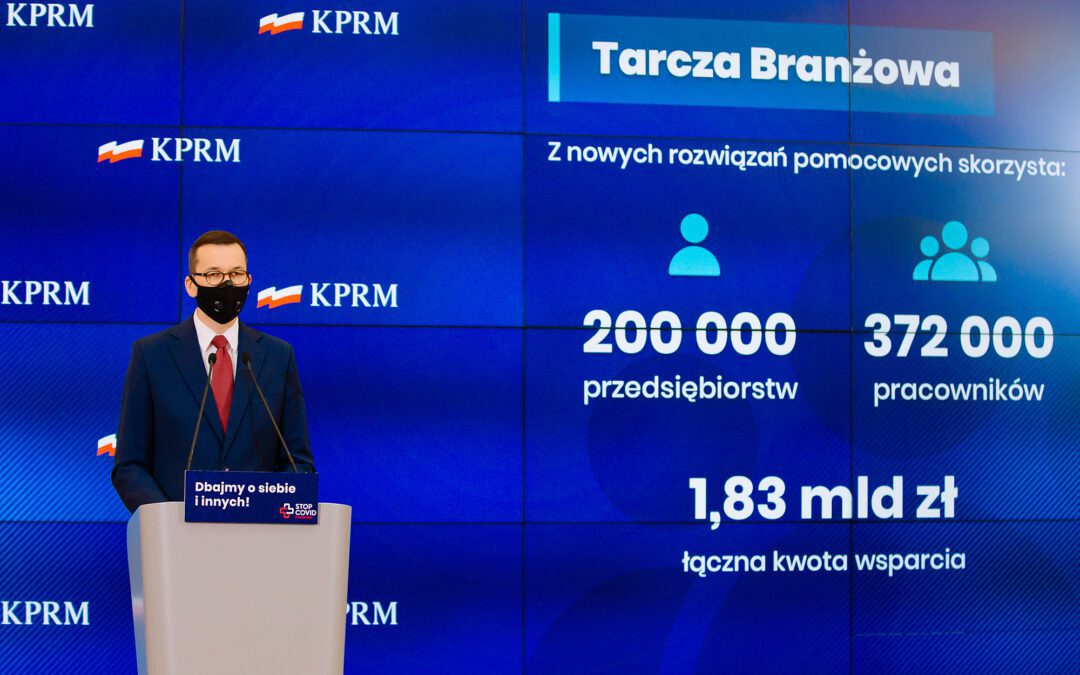Poland’s government has announced a relief package worth around 1.8 billion zloty (€400 million) for businesses hit by the latest coronavirus restrictions.
The new measures aim in particular to help the hospitality, entertainment, fitness and retail industries, which have been directly affected by the government’s moves to restrict or close down certain businesses in order to mitigate record and rapidly rising numbers of coronavirus cases.
Two weeks ago, entertainment and health facilities were ordered to close. Since Saturday, restaurants and bars have been forced to close to in-person customers, with only takeaways and delivery allowed.
Many business owners have held protests against the restrictions, arguing either for them to be reversed or for the government to provide greater support. One gym declared itself a church as it sought to avoid closure.
Gym owners held a protest attended by hundreds in Warsaw earlier this month. On Saturday, thousands turned up for a broader anti-lockdown demonstration in Warsaw that included many business owners but also far-right elements.
The government estimates that the new package, which was unveiled by the prime minister, Mateusz Morawiecki, today, will benefit over 170,000 companies, which employ around 400,000 people.
It will allow firms to be exempted from social security payments in November if they record a 40% drop in income in that month relative to last year. Businesses that record such a drop in either October or November will also be eligible for subsidies of 5,000 zloty (€1,092).
Additionally, the government will provide partial payments towards the salaries of furloughed workers.
Wsparcie w ramach #TarczaBranżowa to:
✅ zwolnienie ze składek ZUS za listopad
✅ postojowe w listopadzie
✅ 5 tysięcy złotych dotacji➡️ #TarczaBranżowa obejmuje branże: gastronomia, rozrywka, zdrowie fizyczne i sprzedaż detaliczna. pic.twitter.com/vcznNnhHcP
— Kancelaria Premiera (@PremierRP) October 27, 2020
Speaking alongside development and labour minister Jarosław Gowin and finance minister Tadeusz Kościński, Morawiecki said that the government will be offering financial support not just for businesses to wait out the lockdown, but also for “restructuring efforts”.
The prime minister said that he hopes that “these matters will end in November”, with businesses reopening under strict sanitary rules. But he assured that the support may be extended as needed “in due course”, reports the Polish Press Agency (PAP).
“We want all businesses that have been affected by the restrictions to be covered by the support programme,” said Morawiecki. He added that Poland was “walking the fine line between an uncontrolled outbreak of the epidemic” and “economic collapse, with long-term troubles”.
On Tuesday Poland again recorded its highest ever daily total of new coronaviruses cases, 16,300. There were also 132 deaths, the fourth-highest figure recorded since the start of the pandemic.
As of Saturday, the Polish government has introduced further restrictions nationwide in an effort to slow the spread of coronavirus, declaring that the whole of Poland will be classified as a “red zone”, with the toughest level of restrictions.
The new restrictions include:
- Restaurants, cafes, pubs and bars must close their doors, with only takeaway and delivery services allowed
- Children in Years 4 to 8 at primary school will move to remote learning (as is already the case for secondary schools and universities)
- People up to the age of 16 will not be allowed outside between 8 a.m. and 4 p.m., apart from under adult supervision
- People aged 70+ should not go out except for: carrying out professional activity, “fulfilling necessary requirements for everyday life”, and participating in or leading religious worship
- Parties, meetings and gatherings will be limited to 5 people not from the same household
- Customer numbers in shopping outlets will be restricted to: 5 people per cash desk in places up to 100 square metres in size; 1 person per 15 square metres in places larger than 100 square metres in size.
Previous measures introduced in the preceding week – including various restrictions on public transport, religious ceremonies and cultural events – continue to apply.
Main image credit: Krystian Maj/KPRM/Flickr (under CC BY-NC-ND 2.0)

Maria Wilczek is deputy editor of Notes from Poland. She is a regular writer for The Times, The Economist and Al Jazeera English, and has also featured in Foreign Policy, Politico Europe, The Spectator and Gazeta Wyborcza.




















